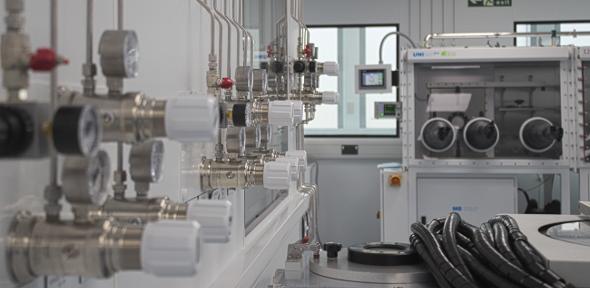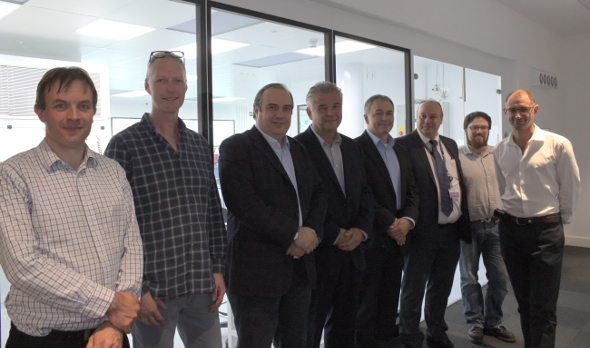
Submitted by Administrator on Thu, 23/11/2017 - 11:27
The Cambridge Graphene Centre is pleased to announce the opening of two new high-specification facilities: cleanrooms for precision fabrication of electrical and optoelectronic devices and a dryroom for large-scale battery prototypes.
The facilities were officially opened on 19 September and are now available for researchers from both academia and industry. The new laboratories expand the capabilities for high-quality electronics, optoelectronics and energy research in Cambridge.
The new class 100 and 1000 cleanrooms in the Cambridge Graphene Centre significantly increase the size of the cleanroom facilities available in Cambridge. The new cleanrooms are connected via a clean lift and also linked with the existing Electrical Engineering cleanrooms with a clean bridge, allowing researchers free movement between the facilities without compromising the quality of devices. The combined clean rooms are now amongst the largest and better equipped amongst UK academic institutions, and competitive worldwide.
The new cleanrooms target micro- and nanofabrication processes. Core equipment focuses on various systems for deposition and etching, including a number of chemical and physical vapour deposition systems, a reactive ion etching suite and photo- and electron-beam lithography. These facilities will also aid the development of technologies based on graphene and related materials that are compatible with silicon chip production, since chip factories – or foundries – rely on clean environments for engineering of precision components.
Lithium batteries must be fabricated in a dry environment as lithium reacts with water. Normally, research into batteries is conducted in an inert atmosphere in gloveboxes, but these provide only a small working area. The new dryroom facilities in the CGC are the driest academic research facilities in the country, and will enable researches to build large-scale battery prototypes. The dryroom will be maintained at humidity levels below 0.5% (typical humidity in an office or home should be between 40-60%).
Dr Yury Alaverdyan, Facilities Manager at the Cambridge Graphene Centre, oversaw the planning and construction of the new cleanroom and dryroom, and is responsible for their ongoing maintenance. “We aim to raise the standards of facilities in Cambridge to the highest level and provide reliable support with a range of fabrication services to our academic and industrial partners,” he said.
The Cambridge Graphene Centre is a centre of excellence for research into graphene and related materials. As with other laboratories in the Cambridge Graphene Centre, the cleanroom facilities are also available for use by companies requiring access to high quality fabrication capabilities.
With the new cleanrooms and dryroom, the Cambridge Graphene Centre is ideally equipped for its world-class research into graphene and related layered materials. Prof Andrea Ferrari, Director of the Cambridge Graphene Centre, said “We are pleased to finally see the last major building works for the Cambridge Graphene Centre to come to fruition. In the next few months we will finalize the set up and testing of all the new instrumentation, completing the start-up phase for the Centre. These state of the art facilities will be open for wide academic and industrial use, and will foster strong collaborative research.”


